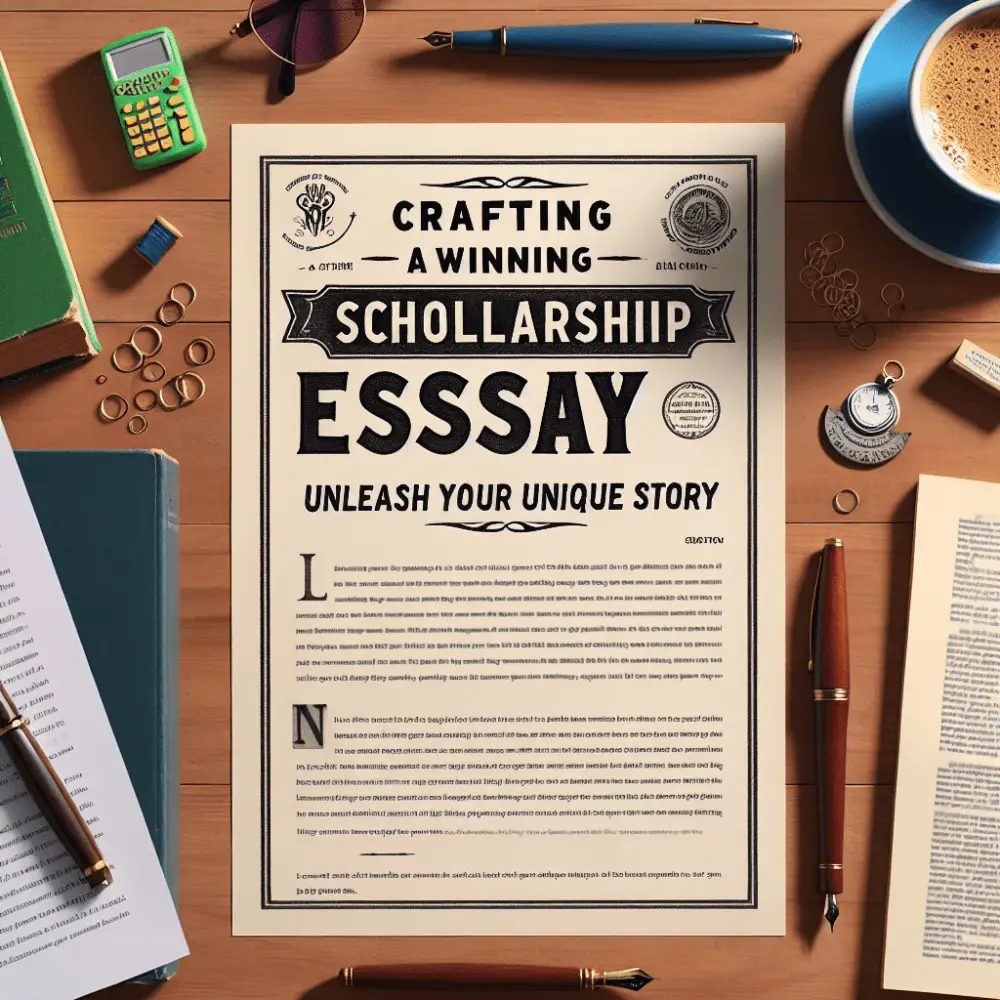
Crafting a Winning Scholarship Essay: Unleash Your Unique Story
Scholarships provide invaluable financial support for students looking to pursue their dreams and obtain a higher education. However, the competition for scholarships can be fierce, with hundreds or even thousands of applicants vying for the same opportunity. So how do you stand out from the crowd and increase your chances of securing that much-needed scholarship? The answer lies in crafting a compelling and unique scholarship essay that showcases your individuality, passion, and potential. In this article, we will guide you through the process of creating a winning scholarship essay that will captivate the judges and set you apart from the competition.
Before delving into the nitty-gritty of writing an exceptional scholarship essay, it is crucial to understand its purpose. A scholarship essay is not just a piece of writing; it is an opportunity for you to tell your story – to showcase the experiences, motivations, and aspirations that have shaped your academic journey thus far. It allows the judges to get to know you beyond your academic achievements and test scores.
Firstly, it’s important to thoroughly research and understand the requirements of the scholarship program you are applying for. Familiarize yourself with their mission statement, values, and any specific criteria they are looking for in applicants. This will enable you to tailor your essay accordingly and address what they are seeking.
Once you have a clear understanding of what the scholarship program is looking for, it’s time to brainstorm ideas for your essay. Think about your own unique story – moments that have impacted you, challenges you have overcome, or experiences that have shaped your character. These could range from personal struggles like financial hardships or family issues to triumphant achievements or even moments of self-discovery.
To ensure a captivating introduction that grabs the reader’s attention from the very beginning, consider starting with an anecdote or a captivating quote related to your chosen theme. For example:
“Growing up in a small town nestled among the vast mountains of Colorado, I was always drawn to the allure of exploration and the power of nature. From an early age, I found solace and inspiration in the intricate patterns carved by river streams and the whispering melodies of wind through the towering pines.”
By connecting with your audience on an emotional level, you set the stage for a captivating narrative that will keep them engaged throughout.
Once you have grabbed their attention, it’s time to transition into your main body paragraphs. These should provide further insight into your unique story through vivid descriptions, personal anecdotes, and compelling examples. Each paragraph should focus on a different aspect or theme that highlights your character, achievements, or future goals.
For instance, if you are applying for a scholarship related to environmental studies, you may want to dedicate one paragraph to describe how your childhood experiences in nature sparked your passion for preserving the environment. In this paragraph, you could mention specific encounters with wildlife or instances where you witnessed firsthand the devastating effects of pollution.
Remember to use strong verbs and be concise in your writing. Instead of saying “I was really interested,” opt for “I was captivated” or “I was driven.” This not only adds more impact to your words but also showcases your ability to communicate effectively.
Moreover, it is important to highlight any extracurricular activities or leadership roles you have undertaken that align with the values and goals of the scholarship program. These experiences demonstrate your dedication, initiative, and potential for future success. Whether it’s volunteering at a local shelter or starting a school club focused on community service – showcase how these activities have shaped you as an individual.
As you approach the conclusion of your scholarship essay, seize the opportunity to convey a strong sense of determination and gratitude. Reiterate your commitment to achieving your goals and emphasize how receiving this scholarship will enable you to make a meaningful impact in your chosen field or community.
In addition to following these guidelines, there are a few crucial tips to keep in mind while crafting your scholarship essay:
1. Be authentic: Don’t try to be someone you’re not. Instead, embrace your own unique voice and perspectives. Authenticity will shine through and leave a lasting impression on the judges.
2. Proofread and edit: Carefully review your essay for grammar, spelling, and punctuation errors. Be mindful of the structure and flow of your writing. Consider seeking feedback from teachers, mentors, or family members to ensure its clarity and effectiveness.
3. Stay focused: While it’s important to tell your story comprehensively, be mindful of staying within the specified word limit. Avoid going off on tangents or including irrelevant information that may distract from your main message.
4. Pay attention to deadlines: Submitting your application on time is crucial for consideration. Set up reminders or create a schedule to ensure you do not miss any deadlines.
5. Be confident but humble: Showcase your achievements and strengths confidently but remember to remain humble throughout the essay.
Now that we have covered the essentials of crafting a winning scholarship essay, let’s address some frequently asked questions:
FAQ
Q1: How long should my scholarship essay be?
A1: The length of a scholarship essay can vary depending on the specific requirements provided by the scholarship program. However, it is advisable to aim for around 500-1000 words unless otherwise specified.
Q2: Can I reuse my scholarship essay for multiple applications?
A2: While certain sections of your essay may overlap for different applications, it is essential to tailor each essay according to the specific requirements of each scholarship program. This ensures that your application stands out and directly addresses what they are seeking in an applicant.
Q3: How can I make my essay stand out from other applicants?
A3: To make your essay stand out, focus on highlighting your unique experiences, perspectives, and goals. Showcase your passion and commitment to your chosen field or community. Use vivid storytelling and concrete examples to captivate the reader’s attention.
Q4: Should I include references in my scholarship essay?
A4: In most cases, scholarship essays do not require formal citations or references. However, if you are using specific facts or statistics, it is advisable to provide a source for credibility.
Q5: Is it necessary to have someone else proofread my essay?
A5: While proofreading your essay yourself is essential, having someone else review it can provide valuable feedback and catch any errors or areas that may require improvement. It is always helpful to seek a fresh perspective.
In conclusion, crafting a winning scholarship essay requires time, reflection, and dedication. By unleashing your unique story with passion, authenticity, and clarity, you can create an essay that not only sets you apart from other applicants but also captivates the judges and increases your chances of securing that much-needed scholarship. So go ahead – embrace your individuality and let your words unleash your potential!

















